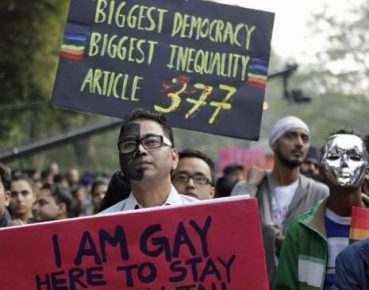Indian Supreme Court: Ruling might overturn anti-LGBT law
Colin Stewart is a 45-year journalism veteran living in Southern…

India’s Supreme Court has raised hopes that it might overturn its 2013 ruling that reinstated the country’s anti-homosexuality law. But the court’s phrasing sounded like a warning that the court doesn’t want to overturn the law.

The court warned that if it declares privacy to be a fundamental right — an issue that it is currently debating — that could lead to a renewed, stronger legal challenge to the 2013 ruling that reinstated the anti-homosexuality law, Section 377 of the Penal Code, which dates back to British colonial times.
The court’s statement was widely reported in India, including in these articles:
- Gay sex may be decriminalised if SC hold right to privacy is a fundamental right (One India)
- Constitution Bench verdict on right to privacy to impact homosexuality case (The Tribune)
- Sec 377 drawn into privacy debate (Daily News and Analysis)
- Right to privacy can never be an absolute entitlement: SC (Times of India)
This is an excerpt from coverage in CNN-News 18:
Right to Privacy: SC Indicates it May Re-look Homosexuality Judgment
A nine-judge bench, led by Chief Justice of India J S Khehar, observed that sexual orientation was a matter of privacy and if the court were to hold privacy as a fundamental right, then the 2013 judgment against homosexuality would be susceptible to a fresh legal challenge.

New Delhi: The debate surrounding the right to privacy took an interesting turn on Wednesday [July 19] with the Supreme Court indicating that its judgment against homosexuality may get reopened if privacy is assigned the status of a fundamental right.
A nine-judge bench, led by Chief Justice of India J S Khehar, observed that sexual orientation was a matter of privacy and if the court were to hold privacy as a fundamental right, then the 2013 judgment against homosexuality would be susceptible to a fresh legal challenge.
As the bench discussed the facets of the right to privacy, Justice D Y Chandrachud said it will be “extraordinarily dangerous” to give an exhaustive catalogue of what will constitute privacy.
“Marriage, procreation are facets of privacy… sexual orientation is also about privacy. If we say there is a fundamental right to privacy, our judgment in Naz Foundation becomes vulnerable,” observed the judge.
In Naz Foundation case, a two-judge bench had in 2013 ruled that Section 377 will continue making gay sex — “irrespective of age and consent” — an offence.
The court had held that Section 377 did “not suffer from any constitutional infirmity” and that it was for Parliament “to consider the desirability and propriety of deleting Section 377 from the statute book or amend it. Under Section 377, voluntary “carnal intercourse against the order of nature with any man, woman or animal,” is punishable with imprisonment from 10 years to life.

This judgment had turned the clock back on the rights of homosexuals in the country, as the SC set aside the historic 2009 Delhi High Court judgment that decriminalised gay sex by holding that Section 377 of the Indian Penal Code, by criminalising consensual sexual acts of adults in private, violated the principles of equality and non-discrimination in the Constitution.
The review petition filed by Naz Foundation against this judgment was dismissed in 2014. But the case is still alive since the curative petition is still pending before the top court.
If the nine-judge bench elevates the status of the right to privacy, the ruling will come handy for Naz Foundation, which has asserted that private acts of consensual sex between consenting adults in private could not be criminalized by sanction of law. …
Related articles:
- International jurists to India: Overturn anti-gay law (April 2016, 76crimes.com)
- Indian Supreme Court will review anti-gay law (February 2016, 76crimes.com)
- India: Growing LGBTI openness, despite legal setback (June 2014, 76crimes.com)
- Orinam’s archive of articles about Indian courts and Section 377
- This blog’s archive of articles about India




I hope not dont overturn it that would ve wrong and a sin to support what is an abomination against God! If u go along with sin u are sinning too!
Are you a Christian/Muslim/Jew?
Homosexuality isn’t considered a sin in the Indian religions.
I dont care its a sin to God thats all that matters! The soul that sins must die thsts what my creator said and thats the truth take it or leave it! What the wicked says means nothing! Only what the lord says and we who obey him and love him!- peace!
The truth is what matters not peoples opinoons
I can’t believe that people like you still exist in 21st century..so narrow minded.. You are talking about the god .. And not ready to accept his own beautiful creatures.
Please don’t try to shove your backward beliefs down the throat of those who don’t want any of it. Take care of your own ass and the world will be a better place.
This is good news if it happens, but why isn’t more attention paid to Africa, as Ghana now is declaring a war on gay people, monitoring emails and pictures and picking up gays and literally beating them, as they don’t honor equal or human rights to anyone that is gay… Please try to report more on the atrocities that is being done to LGBTQ people around the world hoping to draw world attention.